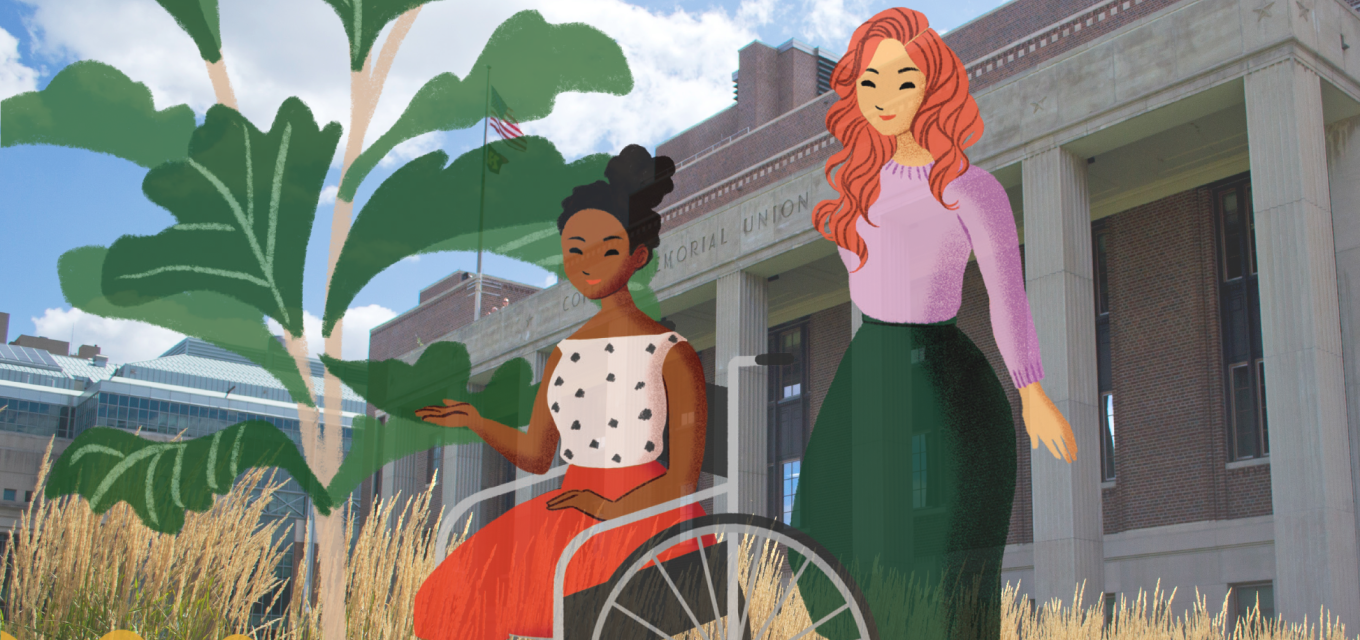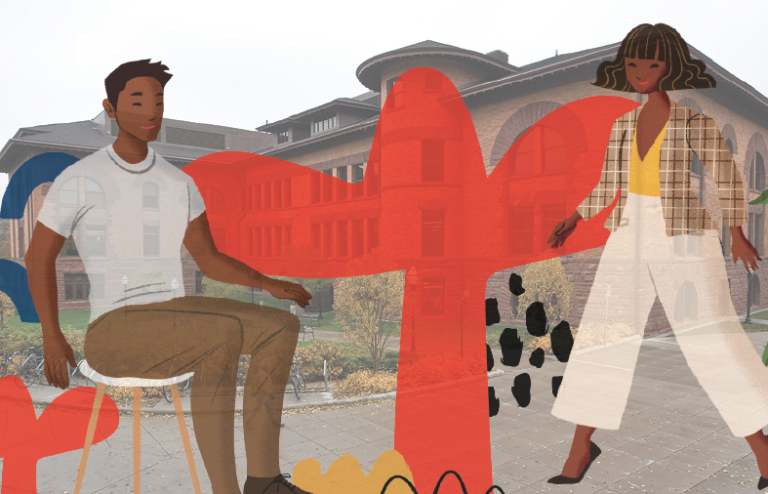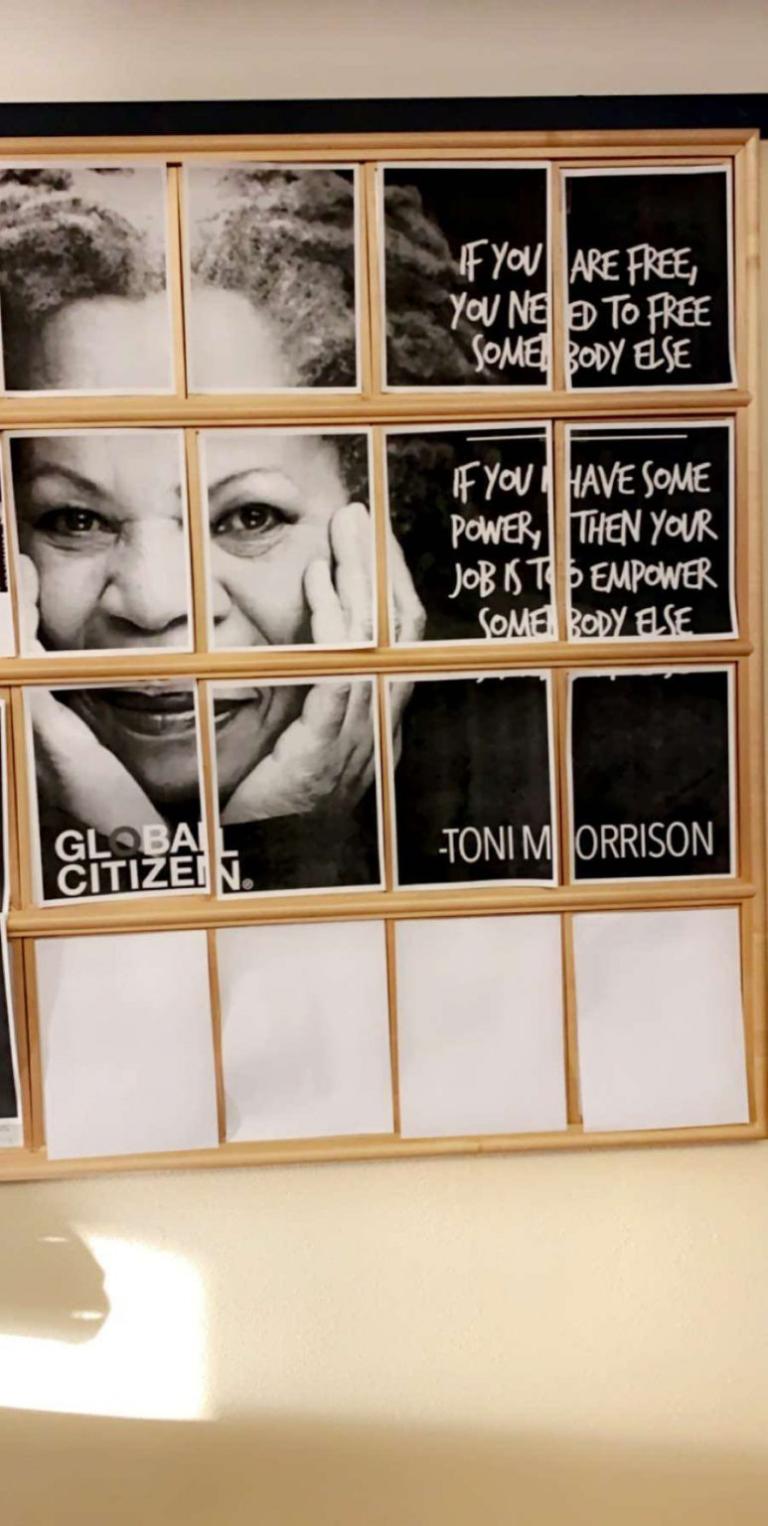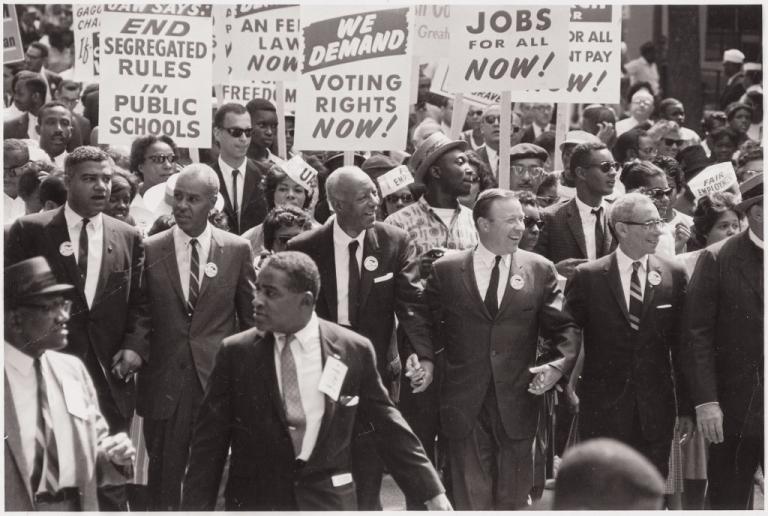2021 Winter

Toward being an antiracist institution
The steps CEHD is taking to bolster its commitment to racial justice, diversity, and inclusiveness
The Death of George Floyd in Minneapolis last May galvanized world opinion that it was beyond time to finally address racial inequities in a meaningful and lasting way. CEHD is not exempt from this reckoning. Although racial justice, diversity, and inclusiveness are among the foundational pillars of the college, more work can and needs to be done.
The fall 2020 issue of Connect was devoted solely to the thoughts and feelings raised by Mr. Floyd’s death upon the CEHD community—alumni, students, staff, and faculty. The issue concluded with a message from the senior management team stressing that the college will be taking steps to continue the conversation by creating new initiatives and bolstering those already in place.
Racial Justice in Professional Education Task Force
A new endeavor at the college level is the Racial Justice in Professional Education Task Force. It is charged with examining the ways racial inequities are embedded in CEHD structures, systems, policies, and practices in professional education programs and how best to mitigate or eliminate them.
“The formation of the task force is a culmination of many years of work that’s been happening in the college,” says co-chair Vichet Chhuon, an associate professor in the Department of Curriculum and Instruction (C&I). “Things kind of came to a head with COVID, the George Floyd murder—basically everything in the news and people being fed up.”
Chhuon’s co-chair is Professor Timothy Lensmire, a C&I colleague. “We got all the specialists together,” he says. “We wanted people who had long records of caring about and worrying about racial justice in their work at the University and in communities. So Vichet and I shared a list with [Interim Dean] Michael who we were hoping to work with. He was enthusiastic with that and luckily the people we asked agreed.”
The group has just started meeting regularly and is currently in a “gathering information” phase. “We’re in a period of study right now doing a meaningful investigation of the lay of the land,” Chhuon says. “Members of the task force have different entry points and we are trying to understand that as well.”
As the task force continues to assemble information, it will be in a better position to define racial justice in terms of the college and offer recommendations for moving forward.
Meet the task force members
Lensmire is proud to note that every single person asked to join the task force readily accepted. They include:
Nicola Alexander, interim associate dean for undergraduate education, diversity, and international initiatives and professor, Department of Organizational Leadership, Policy, and Development: “I was honored to be asked to be part of the conversation and the work. Education matters for children and how we educate and prepare their teachers matters as well. I look forward to advancing racially just programs that enhance the lives of children.”
Tabitha Grier-Reed, professor, Department of Family Social Science: “My mission is around creating access in education. I’m a person who believes in education as tool for upward mobility, but unfortunately I’ve seen students pushed out rather than supported in schools. That has to change. There was this statistic that over 90 percent of teachers in Minnesota are White, but in St. Paul Public Schools for instance, the majority of students are Students of Color. These are discrepancies we must contend with.”
Justin Grinage, assistant professor, C&I: “This gives me the opportunity to do something transformative. It perfectly aligns with the work I want to do as a scholar and aligns with my passion and values as well.”
Stefanie L. Marshall, assistant professor, C&I: “Being a junior scholar that I am, I hope that through works like this my service aligns with the mission and the ways in which I am shaping my scholarly identity. This is an opportunity to do important work that’s meaningful and long-lasting.”
Amanda Sullivan, professor, Department of Educational Psychology: “It fits well with what we’re already trying to do in school psychology—thinking about racial justice as a foundation for how we construct and offer our programs going forward. This is necessary work in the college that will hopefully touch every aspect of what we do here so that we prepare graduates to advance social justice no matter their professional activities.”
Bhaskar Upadhyay, associate professor, C&I: “This work presents to me a much-needed opportunity to bring race at the center of STEM education. Additionally, this is another avenue for me to bring attention to the issues of race and social justice in my works here in the U.S. and also in my home country of Nepal with Indigenous and other marginalized communities.”
C&I’s Race, Justice, and Equity Council
It’s not surprising that the task force counts so many C&I faculty on its roster. For the last couple of years, every member of the department’s faculty and staff have participated in a Race, Justice, and Equity Council.
“Previously, C&I had two distinct groups that were pushing for equity,” says Associate Professor J.B. Mayo, who heads up the council. “One was a diversity committee and the other was the Teachers of Color Council, which was a group of us who got together and thought about ways we could engage the entire faculty on self-education. For a couple of years we had readings and talked about them in small groups about what it meant to our personal lives and in our teaching. It still felt like we weren’t going deep enough.”
So in the fall of 2018, members of the Teachers of Color Council reached out to Lisa Sass Zaragoza, an outreach coordinator in Chicano and Latino Studies at the U as a consultant. She helped C&I envision something deeper and broader in scope and from that evolved the Race, Justice, and Equity Council, which was officially established the next year.
There are six work groups within the council that have their own focus areas:
- Student of Color Recruitment
- Student of Color Support
- Departmental Policies
- Departmental Culture
- Curriculum and Pedagogy
- Thinking Outside the Box
Each of these groups has two chairs. These 12 individuals plus Mayo make up the council. “The idea is that now we have complete buy-in from our departments,” he says. “The leaders of the work groups meet periodically to talk through the issues they want to work on. It’s systemic and strategic.”
And some progress has already been made. “A good example of accomplishment is the Student of Color Recruitment group,” Mayo says. “They’ve taken a deep dive and looked at our prereqs.”
If C&I’s prerequisite classes were all European history, then it could expect only a certain population of students. But if they also included African or Indigenous histories, there would be a better chance of getting Students of Color. “Modifying prerequisites was a big deal that was accomplished,” Mayo says.
Lecturer Jana Lo Bello Miller is the leader of the Support Students of Color work group. “What I think makes this group unique is how it listens to multiple modes of feedback from Students of Color in an effort to make both experiential and systemic change in the department,” she says. “I have found that students are looking for connections, whether that be with their instructors, mentors, potential employers, or with each other. With COVID-19, it is incredibly apparent that C&I Students of Color are seeking these connections to both be together as well as take action together to address issues of inequities within our University and local neighborhood communities.”

Threading racial justice through educational psychology
As Professor Amanda Sullivan said, educational psychology is threading racial justice themes throughout the department. Its academic year was kicked off with a fall retreat focused on anti-racism. Prior to the retreat, all faculty and staff were given the assignment to read and reflect on Me and My White Supremacy by Layla Saad. They were also invited to begin sharing anti-racist resources with each other on a Padlet site. Department members also reviewed a video in which the department chair proposed a five-step process toward their commitment to change, and the department’s Diversity Committee provided an update on its activities over the summer and recommendations for actions.
At the retreat, Anne Phibbs from the Strategic Diversity Initiatives Group led faculty and staff through a workshop to help them begin taking actions to become an anti-racist department. The event concluded with a call for faculty, staff, and student nominations for a new Anti-Racist Action Council to help move the commitment forward. The council is now established and consists of 16 faculty, staff, and students representing the programs and committees of the department.
“We view this work as central to advancing our research, teaching, and engagement with our communities,” says Kristen McMaster, Stern Family Professor of Reading Success and chair of the department. “A core aim of educational psychology is to generate, translate, and apply knowledge and practices that reduce educational inequities and provide opportunities for all people, especially those who have been historically marginalized, to learn, grow, and thrive across their lifespans.”
Besides the retreat, educational psychology faculty as well as students have been keeping busy leading the way with antiracist and diversity initiatives. For example, faculty in the school psychology program have developed a Google Calendar with weekly antiracism activities for the full calendar year. Learn more about this tool. School psychology faculty also started a book group, inviting CEHD faculty, staff, and students to join them in reading Just Medicine by Dayna Matthew, along with National Association of School Psychologists (NASP) members across the country.
Faculty and students published an article featured on the front page of Communiqué, the official newspaper of NASP, on advancing equity during COVID-19. And over the summer, faculty, students, and alumni from the school psychology program partnered with school psychology practitioners in the field, as well as other faculty members in the Department of Educational Psychology, to publish a white paper, “Pursuing Educational Equity in Minnesota through a State-Wide Multi-Tiered System of Support.” This white paper called upon educational and political leadership across the state to seek equity-centered statewide implementation of Multi-Tiered Systems of Support (MTSS). MTSS is a data-driven, problem-solving framework to improve outcomes for all students that relies on a continuum of evidence-based practices matched to student needs.
In September, students across all of the department’s programs came together for the first Diversity Student Group meeting of the academic year. During the meeting, students had the opportunity to get to know one another and work toward finding common ground for future efforts toward equity, social justice, and anti-racism. Students, as well as faculty and staff, who are working to support these efforts and the department’s commitment to change are regularly recognized by having their profiles shared in the department’s newsletters and its social media accounts. View the department’s commitment statement.
“We are committed to this work over the long term,” McMaster says. “Real and sustainable change will take time, and it will take all of us.”
School of Social Work antiracist initiatives
The School of Social Work Diversity and Equity Committee, which has long been a cornerstone of action within the school, spent summer into fall semester working on a proposal of Seven Action Steps to Support Anti-Racist and Decolonizing Reforms brought before it for both immediate and long-term implementation.
In addition, many offerings of the school are directly tied to antiracist initiatives: 15 faculty collaborated on a three-part panel series sharing their research efforts in relation to social justice concerns, including COVID-19, racism, police violence, disparities, and immigration. Learn more.
The Center for Practice Transformation is developing a spring 2021 antiracism conference “Transforming Practice: Expanding Ourselves, Our Knowledge, and Our Reach.”
The Center for Advanced Studies in Child Welfare (CASCW) is collaborating with Ramsey County Children and Family Services to provide unique field placements for Title IV-E child welfare MSW Fellows, particularly IV-E Fellows who identify as BIPOC (Black, Indigenous, and People of Color). This field placement for Title IV-E Fellows within Ramsey County is an opportunity to provide a more in-depth integration of child welfare theory, practice, and racial justice to enhance field and academic learning experiences.

Jim Reinardy, outgoing director of the School of Social Work, in describing the hard work done this past summer by the school’s Diversity and Equity Committee, as well as the challenges faced in bringing the Seven (now Eight) Action Steps through the school council, remarked on the even harder work that was ahead. “We all find ourselves in the cloudy and murky middle of the social work profession, not clearly understanding the ways—some very subtle—all of us in our actions can be complicit, often unintentional, with the policies and actions that institutions often use to oppress BIPOC,” he says. “It will take time and many hard and honest conversations to work through these.”
#ThriveOLPD: Empowerment at Work
#ThriveOLPD began on the back of a napkin as a means to address graduate student mental health. We asked ourselves “what can we do?” “What do we know?” “How do we make our voices heard?”
We partnered with administrators and faculty in the department while stressing the need to better understand the experiences of students whose identities are marginalized. Partnering with Boynton Health allowed us to administer a mental health survey to students in OLPD. This fall we are gathering more data, with a particular focus on the mental health of BIPOC and international students.
Our project has informed us about the different sources of students’ anxiety, depression, and constant worry. We have learned that the graduate experience is different for our BIPOC and international colleagues than it is for White students. Mental health is a racialized issue. Unfortunately, the issues we identified in the spring have been exacerbated by the COVID-19 pandemic (see the latest GradSERU COVID data for some humbling data).
#ThriveOLPD is a starting point. We want to impact the students of our community in a sustainable and positive way. This departmental initiative can chip away at the system that silences the marginalized students and obscures experiences that negatively impact their mental health. As graduate students, we can support each other professionally and personally while collaboratively trying to dismantle systems of oppression that operate in our local community of scholars. And, we can equitably build partnerships with faculty. We can empower each other. The timing is right to reflect on what goes on within these walls and to create a learning experience that is equitable and inclusive.
Lisa S. Kaler and Jesse Lewis
Cofounders of #ThriveOLPD and PhD students in the Department of Organizational Leadership, Policy, and Development (OLPD)
Building on the legacy of the Civil Rights Movement
The roots of the Institute on Community Integration (ICI) dig deeply into the Civil Rights Movement, which informed the early work of University President (and ICI founder) Robert Bruininks. Advancing the rights and inclusion of people with disabilities in similar ways, he has said, was the most rewarding of his career.
Today, ICI builds on that legacy across several fronts:
Its Cultural and Linguistic Competence (CLC) work group, formed early in 2020, formalizes ICI’s ongoing diversity, equity, and inclusion efforts and ties them to the organization’s strategic planning objectives. Since the death of George Floyd, the group has held several lunch-and-learn sessions on racial equity and the intersection of civil and disability rights.

“To truly reduce disparities in education, health, and employment, we must break down both racism and ableism,” says Amy Hewitt, ICI’s director. “No one has greater disparities than People of Color who have disabilities. Our charge at ICI is to bring attention to the need for our communities to promote full inclusion, and to change both policies and practices that allow racism and ableism to continue.”
Toward that end, a work group in September completed a staff-wide survey assessing the organization’s own performance on diversity. While the group hasn’t completed its analysis, the survey did show more than 97 percent of ICI staff members believe the organization is committed to cultural diversity.
Large majorities also said the organization is committed to addressing racial and ethnic disparities among people with disabilities through its work in housing, education, employment, and healthcare, though there is work to be done in how the goals are accomplished, the survey found.
“We’re on the right path, however, there are a lot of opportunities to grow in different areas of our work,” says ICI’s Macdonald Metzger, who co-leads the work group.
Separately, ICI’s Leadership Education in Neurodevelopmental Disabilities (LEND) program actively recruits, trains, and supports fellows from underrepresented racial, ethnic, socioeconomic, religious, gendered, educational, and disabilities backgrounds.
ICI also aims in every research proposal to consider how racial and other disparities may impact the investigative question. Its autism prevalence research through the Autism and Developmental Disability Monitoring Network, for example, has for several years been collecting prevalence data among immigrant groups in addition to data on White, Black, and Hispanic populations, and calling for wider sampling to reach statistical significance among the immigrant groups.
The organization is also partnering with 4-H to develop a replicable model for transforming Minnesota 4-H clubs to be fully inclusive of Youth of Color with intellectual and developmental disabilities.
“This is an opportunity for Youth of Color with disabilities to access resources for relationship building, reducing social isolation, and workforce training,” says Charity Funfe Tatah Mentan, an ICI research associate who is serving as a co-principal investigator on the 4-H project. She also co-leads the CLC work group.
Taken together, all of these efforts represent progress, she says. “We’ve certainly made strides.”
Diversity, equity, and Inclusion work continues in FSOS
The Department of Family Social Science (FSOS) established a committee of faculty, staff, and students to collaboratively deepen understanding and address issues around diversity and equity more than 20 years ago, and are two years into an active diversity, equity, and inclusion strategic plan for the department. However, following the murder of George Floyd, this work has taken on a new urgency and also deepened the FSOS community’s resolve to take action and more fully live into its mission and values in the way it teaches, conducts research, and works in partnership with communities. A large part of this work involves reviewing FSOS policies, processes, procedures, and curriculum using equity and anti-racist lenses.
At a recent meeting of faculty and staff who serve undergraduate students, the group collaborated to outline ways teaching has changed as a result of the dual pandemics of structural racism and COVID-19; how faculty incorporate diversity, equity, and inclusion into courses; and what more is needed to become an antiracist department. All of this work will inform the development of an undergraduate student-learning outcome (SLO) specifically on diversity, equity, and inclusion.
“It’s important for students to see themselves and their families reflected in course content,” says Stacey Horn, FSOS department head. “Particularly as we are seeing more diversity in our undergraduate student population and these students say they want to serve diverse communities. We have a professional and ethical obligation to ensure that our students have the knowledge, experiences, and skills they need to work in and with a diverse range of communities and that this work is both liberatory and transformative.”
At the undergraduate meeting, faculty shared a number of strategies they have used in FSOS courses: initiating discussions about identity and how it is shaped by individual worldviews, introducing ways in classes to think about diversity and carrying that through the entire semester, and intentionally focusing on differences and creating safe spaces inside classes to explore it. Specific methods included a first day of class artifact/identity exercise as way for students to introduce themselves. It also served as a launching point for a class discussion of “cultural artifacts” and what they had in common.
“Students are also adding diversity/equity/inclusion topics to class discussions,” says Horn. “We are also finding opportunities for our students to connect to resources and opportunities in communities.”
Community-based research with diverse communities has been a part of FSOS’ fabric since its founding. Faculty have employed a variety of research methods, including community-based participatory research that advances knowledge and solves problems.
A sample of research collaborations and projects includes:
African American Student Network, established as a safe space for students coping with antiblackness at a predominantly White institution, Tabitha Grier Reed, professor.
“Collaborative Research: African American Family Relationship Research through Partnerships with HBCUs” underwritten by an NSF grant, Chalandra Bryant, professor.
Hmong Children’s Longitudinal Study, examines children’s social and cultural capital change over time, Zha Blong Xiong, associate professor.
East Metro American Indian Diabetes Initiative, promoting health in collaboration with the American Indian community that embraces their heritage, values, and culture, Tai Mendenhall, associate professor.
Police and Black Men Project—Minneapolis, forging connections between police officers and African American men that can lead to better partnerships for community safety and law enforcement, Bill Doherty, professor.
Economic Well-being of Diverse Families Residing in the United States, designed to understand the economic well-being of diverse families residing in the U.S. and in Minnesota, Virginia Solis Zuiker, associate professor.
Parenting College Students—when your child goes to college, comprehensive resources to parents of college students to support and empower successful transitions to college, Jodi Dworkin, professor and extension specialist.
Immigrant Family Financial and Relational Stressors and Coping Strategies during the COVID-19 Pandemic, Catherine Solheim, professor and director of graduate studies
The list goes on as the dialogue continues
This survey of CEHD’s antiracism initiatives is by no means exhaustive. There are many other examples:
The Institute of Child Development (ICD) has a Diversity, Equity, and Inclusion Committee that has representation on all other ICD committees. In addition, a new professional development fund is being offered to staff and PhD students to pursue opportunities related to diversity, equity, and inclusion.
The School of Kinesiology’s Global Institute for Responsible Sport Organizations is launching a Social Innovation in Sport Competition opportunity. Selected students will work with representatives from Minnesota Hockey and the Minnesota Wild during the spring 2021 semester to develop and implement initiatives to improve diversity and inclusion in sport.
In November 2018, Rashné Jehangir, associate professor in the Department of Organizational Leadership, Policy, and Development, led the CEHD-sponsored First Generation Institute, a conference to empower participants to recognize and affirm the intersectional identities of first-generation college students, many of whom are BIPOC and also represent immigrant and refugee populations. A critical question that the institute addresses is not whether first-gen students are ready for college, but how institutions are preparing to be student-ready for an increasingly diverse student population. In November of this year, the institute held a second virtual webinar titled Data Dive: What COVID Context Tells Us about the First-Generation Student Experience.
The 2020 Tucker Center Fall Distinguished Lecture took place in October and featured Drs. Nikki Franke (moderator), Akilah Carter-Francique, Gyasmine George-Williams, Joyce Olushola Ogunrinde, and Nefertiti Walker. The panelists and moderator took a deep dive into the historically erased, silenced, and marginalized voices and actions of Black women and Black female athletes. View video of the event.
Future issues of Connect will be taking a deeper look at many of the initiatives listed in this article as well as others not mentioned and those yet to be developed. The conversation will go on.
Story by the CEHD community | Photos by Fresh Folk/Leni Kauffman, Chris Cooper/University Relations, Patrick O’Leary/University Relations, Rowland Scherman/U.S. National Archives and Records Administration, wikimedia.org, Jayme Halbritter, San Jose State University, Robert Bain, and Nena Ji Media Weddings